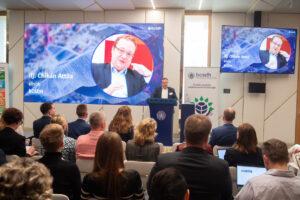No business without nature
We are constantly using up and losing our natural resources. The net zero targets set by governments and businesses to cover 70% of the global economy cannot be achieved without ending deforestation this decade and halting the loss of marine life, which today accounts for 30% of global carbon dioxide swallows. – pointed out Diane Holdorf, Executive Vice-President of the World Business Council for Sustainable Development (WBCSD) at the Business Breakfast and Forum of the Hungarian Business Council for Sustainable Development (BCSDH) held on March 28, which focused on the mutual influence of companies and nature.

Chikán Attila jr., president of BCSDH
As the host of the day, Dr. Csaba Kandrács, Vice President of the Hungarian National Bank, welcomed the participants. The increasingly urgent challenges of our world: the climate emergency, the rapid decline of biodiversity, the dramatically increasing social inequalities and the evaluation of corporate performance only in economic terms. We have no more time, in these four areas we definitely need the highest level of commitment, immediate steps, actions and systemic change.
“We cannot achieve net zero emissions without corporate action that halts and reverses nature loss. Nature represents a third of climate solutions and biodiversity loss is accelerating. Every business is built on nature, offering opportunities to invest in nature-based solutions , which will drive the systemic change we need.” – Diane Holdorf, Executive Vice President of the WBCSD, who represented the business world at COP15 on biodiversity initiated by the UN, where an important international convention was signed to preserve biodiversity.
Katalin Sipos, director of WWF in Hungary, summarized the domestic situation and talked about possible solutions
“Due to the amazing technological development of mankind, we are now used to looking for technical solutions for almost everything. But hi-tech is sometimes not the wisest choice – for the transition to sustainability, we also need cultural and value changes, as well as low-emission, low-tech solutions. Some environmental and the simplest and most ancient solution to problems is the best: nature as a tool.” Katalin Sipos said in her presentation, emphasizing that climate commitments cannot be made at the expense of nature, on the contrary, by building on nature, change can truly be systemic.
Nature is vital to creating healthy humanity, healthy business and a healthy planet
Climate, biodiversity and water are parts of the same system, they are closely connected, and none of them can be separated from the others, they are in constant interaction with each other.
“More than half of the world’s GDP depends on nature and its services. In other words, it affects us all, whether we know it or not, so everyone must act. That is why we made this topic the focus of our 2023 professional program. Systemic changes are needed instead of isolated measures, for which deep and comprehensive cooperation between the business sector, academics, political decision-makers, investors, developers and consumers is essential. We believe that the business sector must play a leading role in achieving this desired, rapid change.” – said Attila Chikán Jr. in the opening speech of the president of the BCSDH.
In the framework of the private forum following the presentations, company managers, corporate, scientific and civil experts discussed the current situation and challenges of biodiversity, water and climate adaptation, and revealed a number of business best practices and solutions.
Related news
ESG: the majority don’t ask for postponement, preparedness level is increasing
🎧 Hallgasd a cikket: Lejátszás Szünet Folytatás Leállítás Nyelv: Auto…
Read more >2026: stricter EU rules and digital waste tracking
🎧 Hallgasd a cikket: Lejátszás Szünet Folytatás Leállítás Nyelv: Auto…
Read more >Related news
How Coca-Cola plans to build more billion-dollar brands
🎧 Hallgasd a cikket: Lejátszás Szünet Folytatás Leállítás Nyelv: Auto…
Read more >








